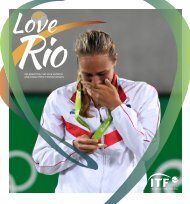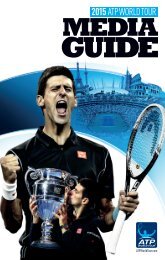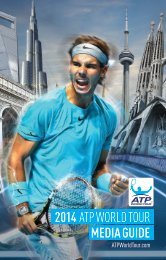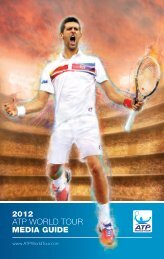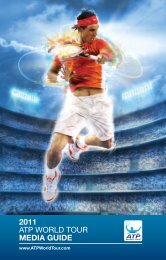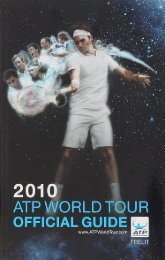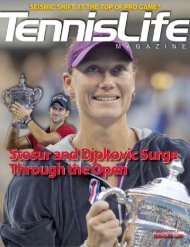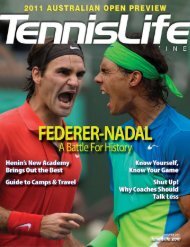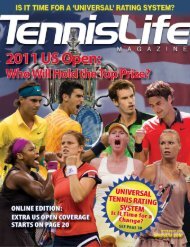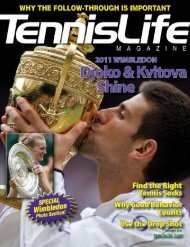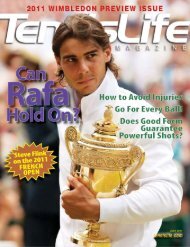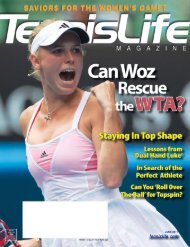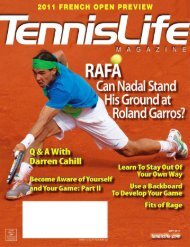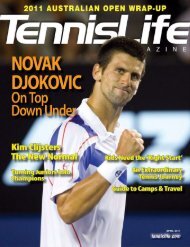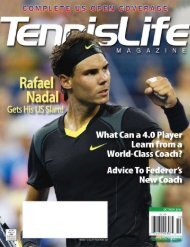A Champion's Mind - Pete Sampras
www.tennismoscow.me Insta:TENNISMOSCOW
www.tennismoscow.me Insta:TENNISMOSCOW
You also want an ePaper? Increase the reach of your titles
YUMPU automatically turns print PDFs into web optimized ePapers that Google loves.
little blurry around the edges. I then told myself that whatever else happened, I could get through this. It<br />
could be as short as seven points. It was just a tiebreaker; I had played a million of them before, and none<br />
of them lasted forever.<br />
At 1–1 in the tiebreaker, all the pain and distress and nervous energy got to me and I got sick. My back<br />
was cramping and my legs felt like they were made of wood, and not entirely under my own control. I<br />
remember playing a tough point and all of a sudden I had this realization: Holy shit, I’m going to throw<br />
up. I’m going to puke—in front of the whole friggin’ world!<br />
It was coming up and there was no way I would stop it. I staggered back from the baseline, and up<br />
came the Coke and acid and whatever else—thankfully, it wasn’t much—that was still in my stomach. By<br />
the time it actually happened, though, I didn’t care. I didn’t really hear or see anything. I didn’t care how I<br />
looked or what anyone thought. I was in my own little world of pain, and as bad as it was, I wasn’t going<br />
to quit the match.<br />
When you throw up like that, and it’s happened to me in training sessions, it’s a sure sign that you took<br />
yourself to the absolute limit—the point of no return. But I needed to push on, I had to get through a few<br />
more points. I was staggering around, my senses dulled and my body aching. I remember playing a hard<br />
point and getting through it, and then it would take me two points to recover. I was aware enough to think<br />
of only one or two things, strategywise. I had to put all I had into the serve and, if I saw a forehand, I had<br />
to let the sucker ride.<br />
We lurched along to 6–6 in the tiebreaker, with me serving. It was time to decide things. I went for<br />
broke on my first serve end and missed. My second serve went wide to his forehand and, to my<br />
everlasting good fortune, Alex guessed backhand. There was nobody home. The ace brought me to match<br />
point. By that stage, the atmosphere was totally supercharged. People were leaning over the railings in the<br />
stadium, hanging into the court, screaming encouragement at me. I didn’t know it, but all over the United<br />
States and the world, things in many places came to an utter standstill as people got sucked into the drama<br />
of it all.<br />
And then Alex blinked. He did the one inexcusable thing, under the circumstances: he double-faulted at<br />
match point. I won without having to take that additional step—one that I might not have been capable of<br />
making.<br />
I left the court completely spent, dehydrated, disorientated, and vaguely aware that I had made a<br />
spectacle of myself. I went right into the doctor’s office under the stands in Louis Armstrong Stadium and<br />
collapsed. They immediately hooked me up to an IV bag. Paul went to gather my things from the locker<br />
room, and when we finally opened the door to leave the doctor’s office, I saw a sea of faces, members of<br />
the press who had staked out the room.<br />
But I didn’t need to talk to the press that day; they already had their story and it was one that more or<br />
less wrote itself. The Corretja match quickly became engraved in everyone’s mind as my defining moment<br />
—my warrior moment. And I was lucky, because other players have won matches like that, but few have<br />
done it at such a conspicuous, crucial moment. If I had played that very same match against Alex in the<br />
second round at Monte Carlo instead of at the U.S. Open, I doubt it would have had anything like the same<br />
impact. It might have been a footnote in the roundup section of most U.S. newspapers.<br />
But it had occurred in the quarterfinals of the U.S. Open, a Grand Slam event and my native major, in<br />
the prime-time slot right after Labor Day when everybody was back from vacation, under the gaze of the<br />
international press corps and before an international television audience. So it became something special,<br />
something the entire world saw and everyone commented on.<br />
The New York crowd had been a tough nut for me. I’m not sure they were ever all that fond of me or my<br />
game. They were accustomed to blustery, bombastic showmen who were great competitors, but not<br />
necessarily elegant or classic players. It’s hard to beat a pair of acts called Jimmy Connors and John<br />
McEnroe. Sure, I had this easy, natural game. I had won half a dozen majors. But I wasn’t very Broadway.



